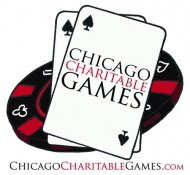There has been some talk about game security and the integrity of the game, and how the two deck shuffling systems is a sure fire way to encourage cheating. This is 100% false, and I believe to be a marketing plan from competitors to drive business their way, and to plant a seed of doubt into the collective Chicago charity poker players mind at large.
I would like to let everyone know how the two deck system works, why it works, and why the integrity of the game could not be more carefully watched.
The two deck system is as follows. Deck one is shuffled and dealt out on the first hand of a new table. While deck one is being used the button or dealer will shuffle deck two. The player in the dealer seat will shuffle the second deck. When the hand is completed the dealer will move the button, give deck one to the player on the button, and deck two will be used for the second hand. BEFORE STARTING HAND NUMBER TWO DECK TWO IS SHUFFLED ONCE, AND THEN CUT BY THE DEALER PRIOR TO THE START OF THE HAND. Every dealer at least shuffles once (some of the faster dealers will shuffle twice) and then cut the deck on top of a cut card so no one can see the bottom card. Therefore if a player was dexterious enough to manipulate the cards to his advantage, any and all manipulation would be void when the dealer shuffles and then cuts the cards prior to the next hand. So there is no way a player could manipulate the deck, because every dealer shuffles and cuts the deck prior to dealing the next hand.
A perfectly shuffled deck of cards, or a truly random shuffle, requires the cards to be shuffled twice, cut into thirds, shuffled and then cut one more time. That is how the single deck shuffle without a shuffle master works. This is how the dealers shuffle at the WSOP and WSOP Circuit Events shuffle the cards.
One large accusation of the two deck player shuffle nay sayers is that players could mark cards. This is 100% true, players could mark cards while shuffling the second deck. However it would be much easier to mark a card that was dealt to you in normal game play, then when shuffling the second deck. For example, it would be much easier to mark a card that was delt to you, rather than shuffling the second deck finding the card you want to mark and then marking it with no one noticing you doing anything funny with the second deck. So experts would say that if a player wanted to mark a card, it would be eaiser to do during regular play, and not when shuffling the second deck.
Marked or Damaged cards and decks (the picture to the left is a small portion of the decks that are pulled from play due to damage or wear and tear) are pulled from regular play at every event. Typically the cards are removed because players squeeze their hands out so hard that the corners become bent. OR the cards have been in use for a while and they are becoming faded and beat up. The charity poker dealers count down their decks before and after every shift, and if a card is beat up they chuck the whole deck into the bad deck box(pictured on the left). This common in every card room in the world, and it is no different at Chicago Charitable Games poker events.
With all that being said in the last year (2009) Chicago Charitable Games, to my best ability of estimating the number of hands played at each event, has dealt out over 675,000 hands. That is averaging 25 hands an hour (a very reasonable guess) on 150 events a year. I think that is a conservative estimate on the number of hands played in the year. Out of those 675,000 hands, 150 events, and the last year of charity poker, there has not been one accusation of cheating, not one instance of cheating, and not one reason to believe any foul play. In fact in over three years of business and arguably 2 million hands of poker, there has never been any instances of a player cheating at these charitable poker games.
I hope this helps clarify the validity of the two deck shuffling system and it eases players mind. If anyone has any questions about the two deck system or about charitable poker games in general please feel free to contact me on the 888 Poker Hot Line (888-715-4837) or on my email address at Ken@chicagocharitablegames.com
Thank you and good luck on the tables,
Ken Kaulen
President and Co-Founder
Chicago Charitable Games Inc.
www.chicagocharitablegames.com
Friday, February 19, 2010
Subscribe to:
Comments (Atom)



